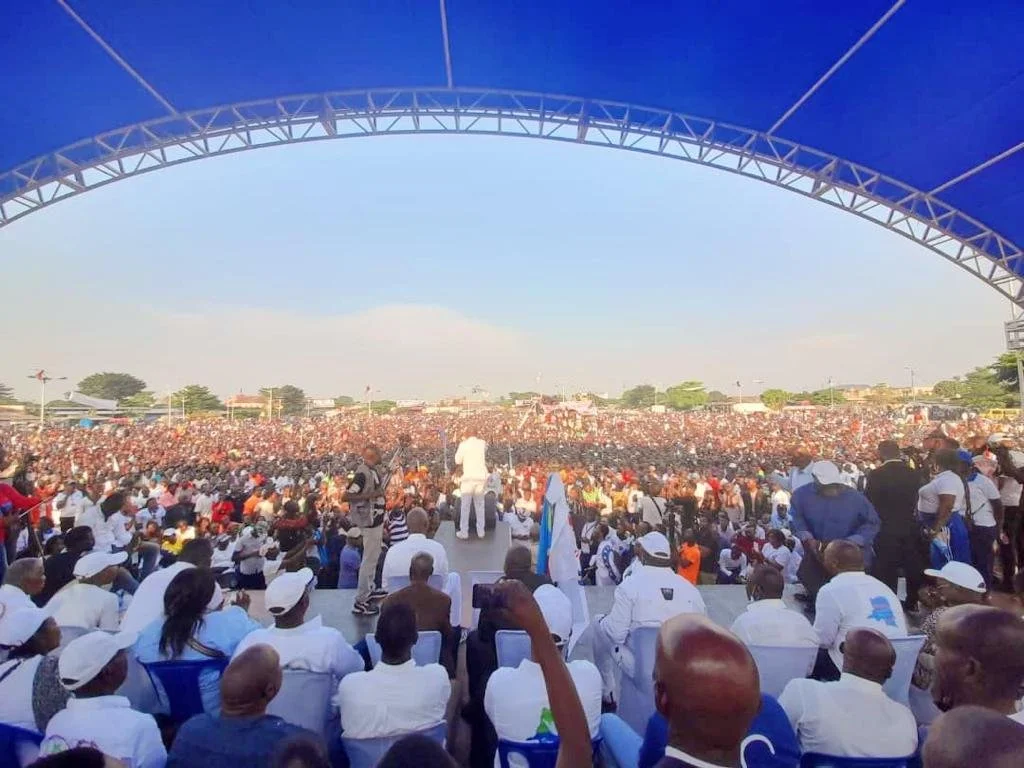Today, Feb. 24, marks the nine-year anniversary of the Peace, Security and Cooperation Framework agreement. In theory, the agreement was designed to address the root causes of the ongoing conflict in eastern Democratic Republic of the Congo, which has had devastating consequences for the country and the wider Great Lakes region.
At the time, there was an acknowledged “window of opportunity” to push through reforms. However, the agreement was flawed from the start. As just one example, it only outlined specific commitments for the DRC. Burundi, Rwanda, and Uganda – all of which have internal problems that have destabilized the DRC – were not held accountable to any pledges.
Put simply, the situation facing DRC was then, and remains, an all-hands-on-deck crisis. The last nine years have seen continued killings of Congolese in South Kivu, North Kivu and Ituri provinces. A lack of political will and stagnation are painfully evident.
As far as DRC is concerned, relatively nothing has been accomplished to translate the agreement’s pledges into action. And while our government’s failings have not affected the health nor standing of our political elite – just last year Mr. Tshisekedi gifted 500 luxury vehicles to deputies for having joined his presidential coalition – the people continue to suffer and die as a result of instability in the east.
There are six commitments to which the DRC agreed to back in 2013. Today, these commitments still represent a realistic agenda for lasting peace, security, and the attainment of dignity for our people. There is hope – but words are not enough.
First and foremost, the DRC committed to security sector reforms, particularly with respect to the country’s army and police. This process has not come close to being realized. In fact, the situation has regressed.
Today, for example, the Citizenship and Development Party spokesperson in Ituri, Luc Malembe is currently imprisoned for criticizing the government's failed policy in the east. Last month, Mumbere Ushindi, an activist from the human rights group LUCHA was shot and killed by the police while peacefully protesting official impunity. And one of our young party leaders in Kinshasa, Luc Mulopwe, has been languishing in the jails of the National Intelligence Agency since Dec. 14. Instead of reforming the security sector, our government has weaponized it against the very people who are advocating for justice, democracy, and peace.
The second commitment was to consolidate state authority, particularly in eastern DRC, to prevent armed groups from destabilizing our neighboring countries. Ituri and North Kivu province have been under a "state of siege" since May 6, ostensibly to support a military offensive aimed at neutralizing armed groups who target civilians and the army. Instead of consolidating state authority, this move led to a resurgence in violence. Over 2,400 Congolese citizens have been killed in the ensuing violence. This figure represents more than a 70% increase in civilian deaths compared to the same time period the year prior.
The third commitment requires the DRC to “make progress with regard to decentralization.” Political decentralization gives citizens, and their elected representatives, more power in public decision-making. If you do not know where I’m going by now, read these articles for important background. Instead of decentralization, the DRC has experienced massive centralization in tandem with democratic backsliding. This is no coincidence.
Fourth, under the framework, the DRC committed to further economic development with respect to the expansion of infrastructure and social service delivery. One could cite any number of statistics about the government’s failings, but let’s highlight the worst of it: our education system. According to USAID, 3.5 million Congolese children of primary school age are not in school. National data indicate that only 67% of children who enter first grade will complete sixth grade. Making matters worse, data from the UN peacekeeping force in Congo (MONUSCO) shows that armed groups in South Kivu recruited more than 470 child soldiers into their ranks in 2021. Our country’s future is being robbed before our eyes.
Fifth, the DRC committed to major reforms of government institutions. Once again, this commitment rings hollow. Instead of reforming our institutions, Mr. Tshisekedi has fatally undermined them – most egregiously this past year, when he subverted the process for appointing members of the Independent National Electoral Commission (CENI). Mr. Tshisekedi unilaterally handpicked nominees, despite outcry from respected leaders from the Catholic and Protestant churches, as well as from the Congolese people writ large.
Relatedly, corruption has skyrocketed. According to the latest Corruption Perceptions Index, published by Transparency International, DRC ranks 169/180 countries worldwide.
Lastly, the framework called on the DRC to deliver an agenda of “reconciliation, tolerance, and democratization.” The current government embodies none of these aspirations, especially after the stolen election of 2018, to cite just one of the more glaring examples.
Nevertheless, there is hope.
While some politicians seek to suppress or deny it, there is a growing democratic consciousness in the DRC. The Congolese people – especially our youth – are steadfast in their commitment to building a more just society. The world saw our democratic flame burn brightly in the lead up to and during the 2018 election. And despite having our democracy deferred, people remain strong and united. Citizens of the DRC, and indeed this world, must stand together for democratic renewal. Only then can the Democratic Republic of Congo uphold our commitments and translate them into concrete actions for the benefit of our people and the broader region.
Hon. Martin Fayulu is the President-elect of the Democratic Republic of Congo and leader of the Engagement for Citizenship and Development party. He also serves as chair of the Congo-based Commitment to Citizenship and Development. You can follow him on Twitter at @MartinFayulu.
DISCLAIMER: This material is distributed by Vanguard Africa on behalf of Hon. Martin Fayulu. Additional information is available at the Department of Justice, Washington, DC. The views expressed in this publication do not necessarily reflect the views of Vanguard Africa, the Vanguard Africa Foundation, or its staff.

